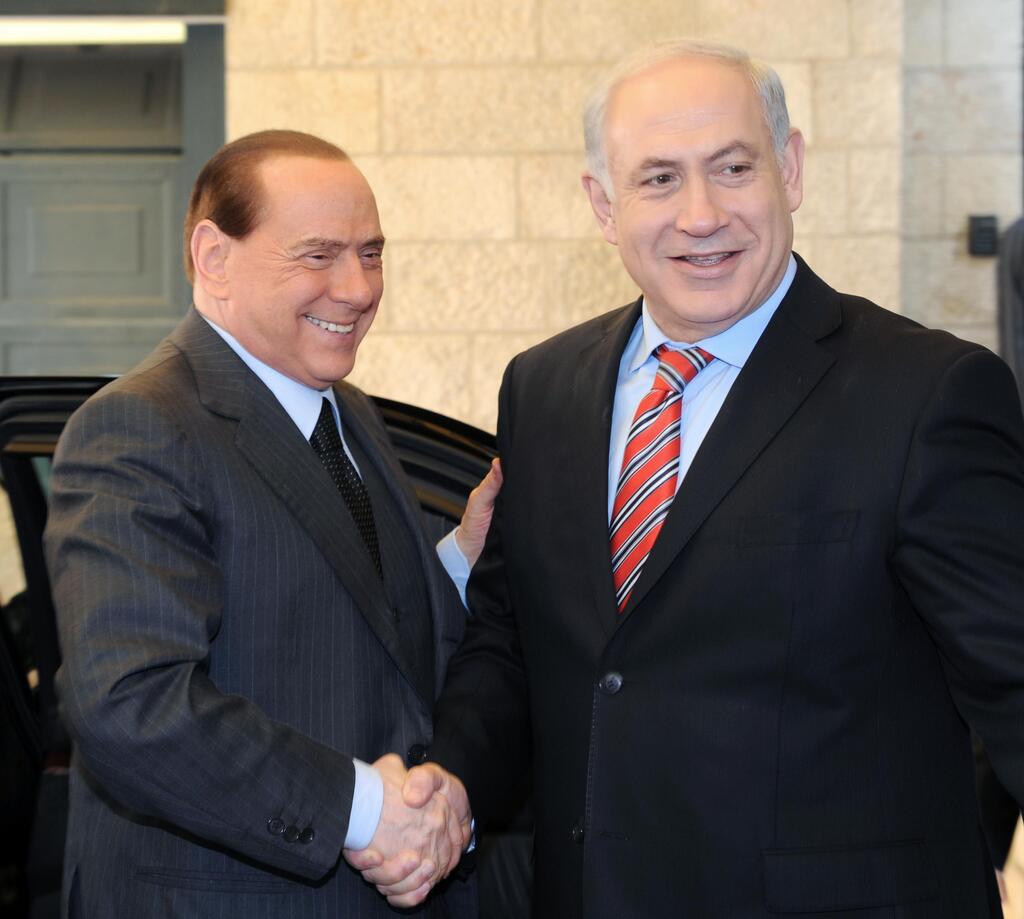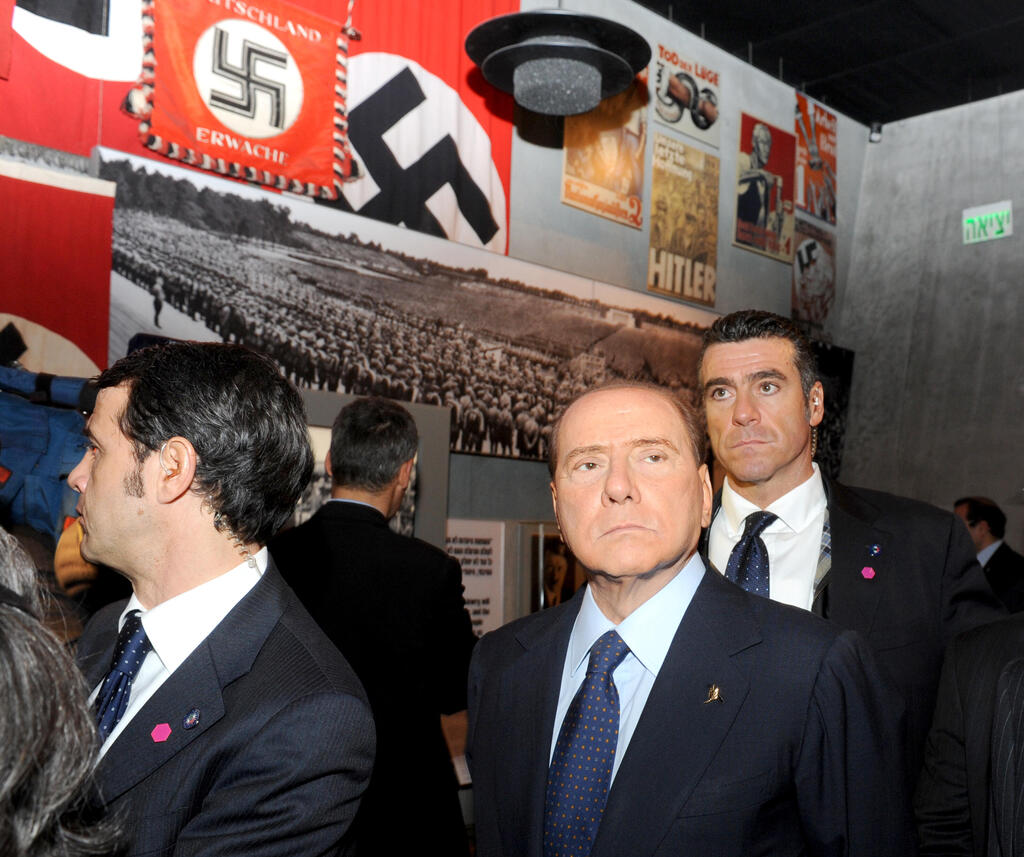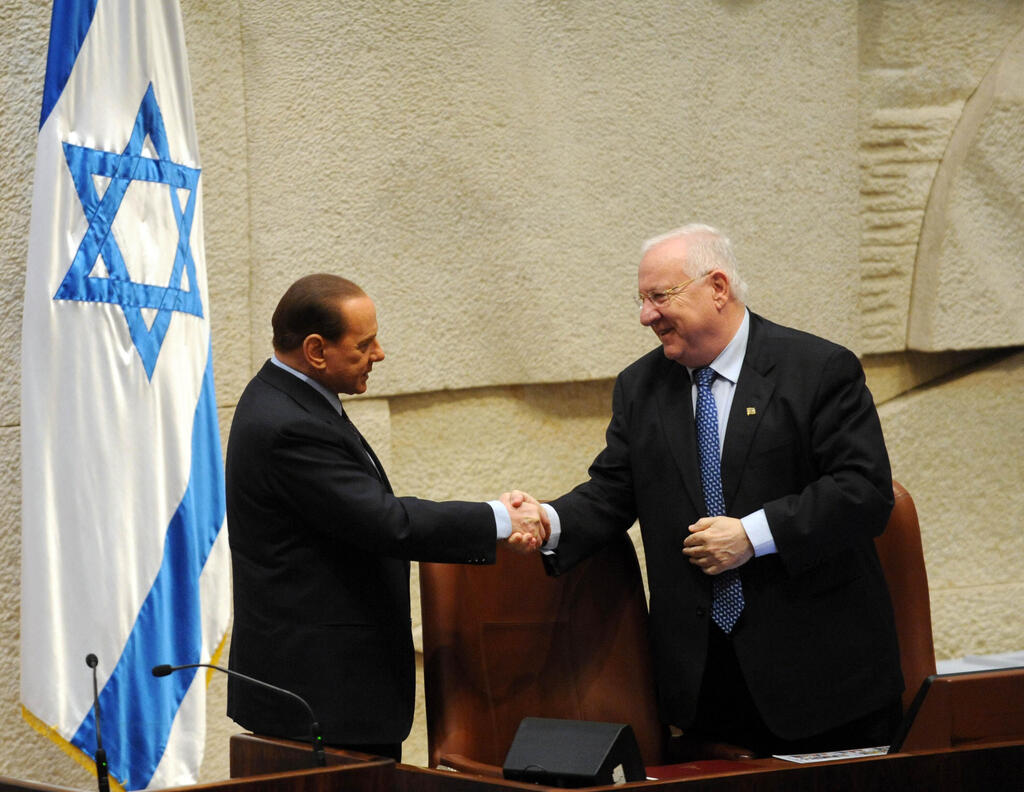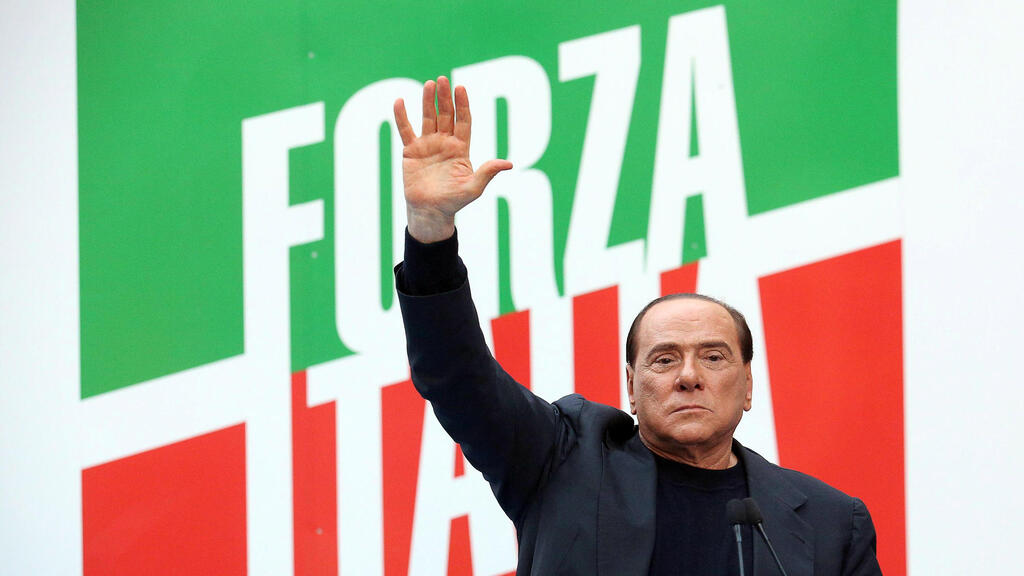Getting your Trinity Audio player ready...
Former Prime Minister Silvio Berlusconi, a billionaire businessman who created Italy's largest media company before transforming the political landscape, died on Monday. Berlusconi, who was Italy's longest-serving premier despite scandals over his sex-fueled parties and allegations of corruption, was 86.
More stories:
The prime minister during 1994-1995, 2001-2006 and 2008-2011, had been suffering from leukemia and had recently developed a lung infection for which he was hospitalized on Friday. He also suffered over the years from heart ailments, prostate cancer and was hospitalized for COVID-19 in 2020.
4 View gallery


Silvio Berlusoni visits Prime Minister Benjamin Netanyahu in Jerusalem in 2010.
(GPO)
Berlusconi's Forza Italia party is part of Prime Minister Giorgia Meloni's right-wing coalition and, although he himself did not have a role in government, his death is likely to destabilize Italian politics in the coming months.
He frequently stressed his support for Israel and Jewish causes and his “role as a longtime friend of the Jewish people and the state of Israel, which is and remains a unique defense of freedom and democracy throughout the Middle East.”
"I was deeply saddened by the passing of Silvio Berlusconi, the former Prime Minister of Italy. My heartfelt condolences go out to his family and to the people of Italy," Israeli Prime Minister Benjamin Netanyahu said in a statement. "Silvio was a great friend of Israel and stood by us at all times. Rest in peace my friend."
Berlusconi's business empire faces an uncertain future. He never publicly indicated who would take full charge of his MFE (MFEB.MI) company following his death, even though his eldest daughter Marina is expected to play a prominent role.
A onetime cruise ship crooner, Berlusconi used his television networks and immense wealth to launch his long political career, inspiring both loyalty and loathing.
4 View gallery


Silvio Berlusconi during a tour at Yad Vashem Holocaust memorial museum in Jerusalem in 2010
(Mark Neyman/GPO)
To admirers, the three-time premier was a capable and charismatic statesman who sought to elevate Italy on the world stage. To critics, he was a populist who threatened to undermine democracy by wielding political power as a tool to enrich himself and his businesses.
His friendship with Russian President Vladimir Putin put him at odds with current Premier Giorgia Meloni, a far-right leader who came to power last year and who is a staunch supporter of Ukraine. On his 86th birthday, while the war raged, Putin sent Berlusconi best wishes and vodka, and the Italian boasted he returned the favor by sending back Italian wine.
As Berlusconi aged, some derided his perpetual tan, hair transplants and live-in girlfriends who were decades younger. For many years, however, Berlusconi seemed untouchable despite the personal scandals.
Criminal cases were launched but ended in dismissals when statutes of limitations ran out in Italy's slow-moving justice system, or he was victorious on appeal. Investigations targeted the tycoon's steamy so-called "bunga bunga" parties involving young women and minors, or his businesses, which included the soccer team AC Milan, the country's three biggest private TV networks, magazines and a daily newspaper, and advertising and film companies.
Only one led to a conviction - a tax fraud case stemming from a sale of movie rights in his business empire. The conviction was upheld in 2013 by Italy's top criminal court, but he was spared prison because of his age, 76, and was ordered to do community service by assisting Alzheimer's patients.
4 View gallery


Silvio Berlusconi greets Israel's then-president, Reuven Rivlin, at the Knesset in 2010.
(Amos Ben Gershom/GPO)
He still was stripped of his Senate seat and banned from running or holding public office for six years, under anti-corruption laws.
He stayed at the helm of Forza Italia, the center-right party he created when he entered politics in the 1990s and named for a soccer cheer, "Let's go, Italy." With no groomed successor in sight, voters started to desert it.
He eventually held office again - elected to the European Parliament at age 82 and then last year to the Italian Senate.
He suffered personal humiliations as well. Berlusconi lost his standing as Italy's richest man, although his sprawling media holdings and luxury real estate still left him a billionaire several times over.
In 2013, guests at one of his parties included an under-age Moroccan dancer whom prosecutors alleged had sex with Berlusconi in exchange for cash and jewelry. After a trial spiced by lurid details, a Milan court initially convicted Berlusconi of paying for sex with a minor and using his office to try to cover it up. Both denied having sex with each other, and he was eventually acquitted.
He stirred anger after the Sept. 11, 2001, terrorist attacks in the United States by claiming Western civilization was superior to Islam.
4 View gallery


Former Italian Prime Minister Silvio Berlusconi transformed the political landscape
(Photo: EPA)
When criticized in 2003 at the European Parliament by a German lawmaker, Berlusconi likened his adversary to a concentration camp guard. Years later, he drew outrage when he compared his family's legal woes to what Jews must have encountered in Nazi Germany.
In response to the furor over the remarks, that Berlusconi said were taken out of context, he said: “My history, my friendship toward Israel, my consistent government action at the international level in favor of the State of Israel, do not allow any doubt about my awareness of the tragedy of the Holocaust and my respect for the Jewish people.”
Berlusconi was born in Milan on Sept. 29, 1936, the son of a middle-class banker. He earned a law degree, writing his thesis on advertising. He started a construction company at 25 and built apartment complexes for middle-class families on Milan's outskirts, part of a postwar boom.
But his astronomical wealth came from the media. In the late 1970s and 1980s, he circumvented Italy's state TV monopoly RAI by creating a de facto network in which local stations all showed the same programming. RAI and his Mediaset network accounted for about 90% of the national market in 2006.
First published: 13:42, 06.12.23

